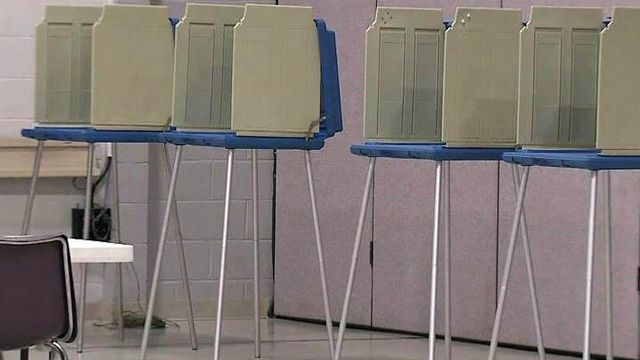NC voters pick final party nominees for fall races
Few North Carolina voters would be headed to the polls Tuesday for runoff elections to choose party nominees for statewide, congressional, legislative and even some local races.
Posted — UpdatedVoters already picked their party favorites in the May 8 primary, but some first-place candidates failed to receive the more than 40 percent needed to win outright, requiring the top two vote-getters to advance to a runoff. The candidate with the most votes for each race Tuesday will advance to the fall election.
Polls are open from 6:30 a.m. to 7:30 p.m.
Election administrators expected turnout statewide to be very low, at about 2.5 to 3 percent, even with more statewide and congressional runoffs than in recent memory. With 10 weeks between the first primary and Tuesday voter interest has been lukewarm save for a few hot spots where campaign placards and commercials have been plentiful.
Fewer than 37,000 people had turned in ballots statewide through the early voting period that ended over the weekend, or well below 1 percent of the state's nearly 6.3 million voters, according to the State Board of Elections. That's about the same number of early voters during 2010 primary runoffs, when there was only one statewide race.
"It surprised me tremendously," said Gary Bartlett, executive director of the State Board of Elections, who had hoped that runoff turnout would exceed 8 percent, the highest he's seen during his 20 years as director.
The leading races included five runoffs for Council of State positions, including the Republican nomination for lieutenant governor between Raleigh architect Dan Forest and Wake County Commissioner Tony Gurley. There are also three GOP runoff elections for congressional districts — two around Charlotte and a third in the mountains.
Early voting was stronger in Mecklenburg County, which anchors the 9th Congressional District and the district runoff race between former Sheriff Jim Pendergraph and ex-state Sen. Robert Pittenger. Other GOP runoff races are in the 8th District between Richard Hudson and Scott Keadle and in the 11th District between Mark Meadows and Vance Patterson.
There was only one statewide Democratic runoff — the primary party for labor commissioner between John Brooks and Marlowe Foster.
Three additional GOP races for the Council of State are between Richard Alexander and John Tedesco for superintendent of public instruction; Mike Causey and Richard Morgan for insurance commissioner; and Kenn Gardner and Ed Goodwin for secretary of state.
There are seven runoffs for General Assembly seats, only one of which involves an incumbent in Sen. Chris Carney, R-Lincoln. A couple of winners from legislative races would face no general election opposition.
Nearly all registered voters could cast ballots in the runoff, including those who didn't vote in the May primary. Libertarians and unaffiliated voters who voted only in nonpartisan races in May could not vote.
The cost of the statewide runoff is between $6 million and $7 million from state and local sources, Bartlett said. The cost includes producing ballots, many which will never be used due to low turnout, and staffing voting precincts statewide.
Copyright 2024 by WRAL.com and the Associated Press. All rights reserved. This material may not be published, broadcast, rewritten or redistributed.






